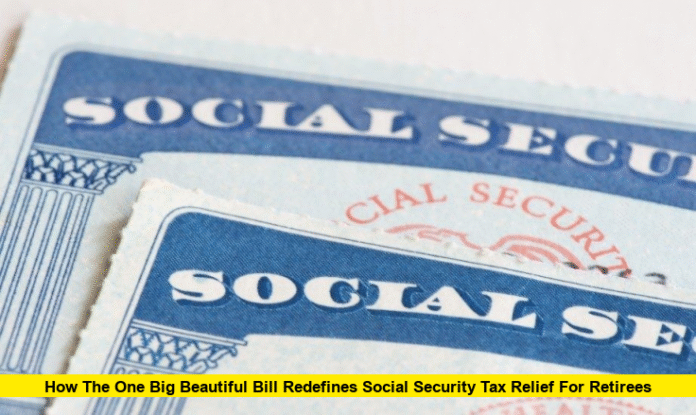The One Big Beautiful Bill introduces sweeping reforms to Social Security taxation, taking effect from August 2025, and promises the most substantial tax relief older Americans have seen in decades. This historic change brings a new, targeted deduction of up to $6,000 for seniors aged 65 and older, spread over the years 2025 to 2028. For the first time in years, the majority of retirees will see their Social Security benefits completely free of federal income tax, ensuring more financial stability in retirement.
The purpose of this reform is clear — to protect seniors who rely heavily on fixed incomes from unnecessary tax burdens, especially during a time of rising living costs and inflation. The bill prioritizes those who need help the most, while setting specific income thresholds to focus relief on middle- and lower-income retirees.
Impact by Retiree Group
Seniors (65+) with Modest Income
Under the new law, seniors aged 65 and over will enjoy an additional tax deduction of up to $6,000. For married couples filing jointly, this can mean a combined deduction of $12,000. This deduction is designed to directly reduce taxable income, meaning that many in this age group will pay little to no federal income tax on their Social Security benefits.
The deduction will be phased in over four years and is available only to those with modified adjusted gross income (MAGI) below set limits — $75,000 for individuals and $150,000 for couples. Those earning above these amounts will not qualify, keeping the benefit targeted toward those most in need. For eligible seniors, this could mean saving thousands of dollars each year, providing breathing room to manage healthcare costs, groceries, housing, and other essentials.
Middle- and Lower-Income Retirees
The largest beneficiaries of the One Big Beautiful Bill will be retirees with moderate or low income. Nearly nine out of ten in this group will see 100% of their Social Security benefits excluded from federal taxation.
Previously, many retirees with even a small amount of additional income — such as part-time work or a modest pension — would face taxes on a portion of their Social Security benefits. Now, those same retirees will keep that money in their pockets.
Highlights for this group include:
- Full elimination or major reduction of Social Security taxes.
- Extra protection for those living on fixed incomes during high inflation.
- Freedom to earn modest additional income without triggering higher taxes.
For millions of Americans, this change means the ability to better manage monthly budgets and unexpected expenses without sacrificing essentials.
Wealthier Retirees
For retirees with higher incomes, the impact of the bill will be minimal. The new deduction completely phases out for individuals earning more than $75,000 annually and couples earning over $150,000.
Those above these thresholds will continue under the existing tax system, which can subject up to 85% of Social Security benefits to federal taxation. While wealthier retirees may support the bill’s goals, their own tax situations will remain largely unchanged unless their income falls below the eligibility limits in a future year.
Financial planners are advising higher-income retirees to consider strategies that could help them qualify for the deduction later, such as adjusting withdrawals from retirement accounts or utilizing tax-efficient investment options.
Younger Recipients (Under 65)
This category includes disabled workers, survivors, and dependents who receive Social Security benefits but are not yet 65. They will not be eligible for the new $6,000 deduction, and their benefits will continue to be taxed under current rules.
Although they are excluded from this change, they will still receive their regular Social Security payments without any reduction caused by the new legislation.
Why This Matters
Social Security is a lifeline for millions of Americans, but for decades many retirees have been surprised to learn they must pay federal income tax on their benefits. The thresholds for taxation have remained unchanged since the 1980s, meaning inflation has pushed more and more seniors into paying taxes on what was originally intended to be tax-free retirement income.
The One Big Beautiful Bill directly addresses this long-standing problem. By increasing deductions and raising the amount of benefits shielded from taxes, it restores a greater share of Social Security to those who depend on it most.
Beyond the financial relief, this reform promotes economic dignity for retirees. It reduces the stress of making ends meet on a fixed income and provides additional resources for essentials such as medical care, housing, and everyday living expenses. The extra money circulating in local communities could also help stimulate the economy, benefiting small businesses and service providers that seniors rely on.
However, it’s important to note that this deduction is temporary, set to expire after 2028. Retirees should take advantage of the benefit while it lasts and plan for potential changes in future tax laws.
Summary: Who Benefits Most?
| Group | Impact of the One Big Beautiful Bill |
|---|---|
| Seniors 65+ with modest income | Up to $6,000 deduction; major tax relief on Social Security benefits |
| Middle- and lower-income retirees | Nearly 88–90% pay zero federal taxes on Social Security |
| Wealthier retirees | No major benefit — deductions phase out at high income levels |
| Younger recipients (under 65) | Not eligible — existing rules still apply |
The One Big Beautiful Bill marks a major milestone in Social Security reform. It delivers meaningful tax relief for millions of older Americans, especially those living on limited incomes. While higher earners and younger beneficiaries see little change, the targeted nature of this bill ensures help goes where it’s most needed.
Retirees and their families should stay informed about these changes, take advantage of the relief while it lasts, and share their thoughts on how it impacts their daily lives.
